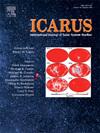CS 的最新紫外线荧光效率:彗星中由紫外线衍生的 CS 丰度增强过程中模型差异的证据
IF 3
2区 物理与天体物理
Q2 ASTRONOMY & ASTROPHYSICS
引用次数: 0
摘要
对一硫化碳(CS)的观测由来已久,它是原子硫的遥感替代物,更广泛地说,是彗星体中的硫库之一。最近,人们发现紫外光和射电得出的 CS 丰度之间的系统性差异超过了 2-5 倍,而紫外光得出的丰度在一系列彗星中似乎都有所提高。对彗星CS在紫外线下发射的解释一直依赖于一系列模糊且记录不全的计算,其准确性很难评估。我们报告了 CS 自由基的新荧光效率,它采用了振动态高达 v=8 和旋转态高达 N=100 的旋转振动结构。这些模型利用了从实验室电子撞击实验中得出的一组新的能带转换率。与 IUE 对 C/1979 Y1(布拉德菲尔德)的观测结果进行的基准比较显示,荧光模型与之非常吻合。目前的结果肯定了通过 IUE 和 HST 在彗星中的紫外线 CS 发射得出的 CS 丰度历史记录的准确性,但无法解释在相同的观测中,相对于射电测量,由紫外线得出的 CS 丰度持续提高的现象。讨论了紫外光和射电得出的 CS 丰度之间存在 2-5 倍差异的其他解释,以及与原行星盘中硫库的可能联系。模型代码和计算的荧光效率可在 Zenodo 服务上公开获取。本文章由计算机程序翻译,如有差异,请以英文原文为准。
Updated ultraviolet fluorescence efficiencies of CS: Evidence for model discrepancies in the enhancement of NUV-derived CS abundances in comets
Observations of carbon monosulfide (CS) have a long history serving as a remote proxy for atomic sulfur, and more broadly, one of the sulfur reservoirs in cometary bodies. Recently, systematic discrepancies between NUV- and radio-derived CS abundances have been found to exceed a factor of 2–5, with NUV-derived abundances appearing enhanced for a wide array of comets. Interpretation of cometary CS emission in the ultraviolet has relied on a murky and ill-documented lineage of calculations whose accuracy can be difficult to assess. We report new fluorescence efficiencies of the CS radical, utilizing a rovibrational structure with vibrational states up to and rotational states up to . The models utilize a new set of band transition rates derived from laboratory electron impact experiments. Benchmark comparisons to IUE observations of C/1979 Y1 (Bradfield) show favorable agreement with the fluorescence models. The present results affirm the accuracy of the historical record of CS abundances derived via ultraviolet CS emission in comets with IUE and HST, but do not explain the consistent enhancement of NUV-derived CS abundances relative to the radio measurements during the same apparitions. Alternative explanations of the factor of 2–5 discrepancy between NUV- and radio-derived CS abundances are discussed, as well as possible connections to sulfur reservoirs in protoplanetary disks. The model code and computed fluorescence efficiencies are made publicly available on the Zenodo service.
求助全文
通过发布文献求助,成功后即可免费获取论文全文。
去求助
来源期刊

Icarus
地学天文-天文与天体物理
CiteScore
6.30
自引率
18.80%
发文量
356
审稿时长
2-4 weeks
期刊介绍:
Icarus is devoted to the publication of original contributions in the field of Solar System studies. Manuscripts reporting the results of new research - observational, experimental, or theoretical - concerning the astronomy, geology, meteorology, physics, chemistry, biology, and other scientific aspects of our Solar System or extrasolar systems are welcome. The journal generally does not publish papers devoted exclusively to the Sun, the Earth, celestial mechanics, meteoritics, or astrophysics. Icarus does not publish papers that provide "improved" versions of Bode''s law, or other numerical relations, without a sound physical basis. Icarus does not publish meeting announcements or general notices. Reviews, historical papers, and manuscripts describing spacecraft instrumentation may be considered, but only with prior approval of the editor. An entire issue of the journal is occasionally devoted to a single subject, usually arising from a conference on the same topic. The language of publication is English. American or British usage is accepted, but not a mixture of these.
 求助内容:
求助内容: 应助结果提醒方式:
应助结果提醒方式:


